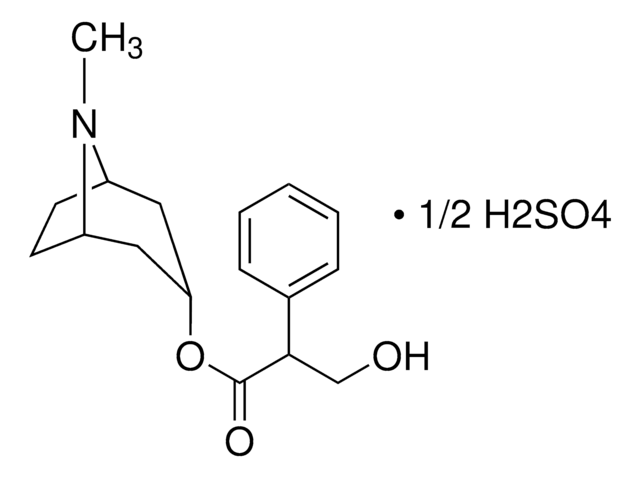PHR1379
Atropine Sulfate
Pharmaceutical Secondary Standard; Certified Reference Material
Synonym(s):
Atropine sulfate salt monohydrate, α-(Hydroxymethyl)benzeneacetic acid 8-methyl-8-azabicyclo[3.2.1]oct-3-yl ester, Tropine tropate
About This Item
Recommended Products
grade
certified reference material
pharmaceutical secondary standard
Quality Level
Agency
traceable to BP 23
traceable to Ph. Eur. A1400000
traceable to USP 1045009
API family
atropine
CofA
current certificate can be downloaded
technique(s)
HPLC: suitable
gas chromatography (GC): suitable
mp
189-192 °C (A) (lit.)
application(s)
pharmaceutical (small molecule)
format
neat
storage temp.
2-8°C
SMILES string
O.OS(O)(=O)=O.CN1[C@H]2CC[C@@H]1C[C@@H](C2)OC(=O)C(CO)c3ccccc3.CN4[C@H]5CC[C@@H]4C[C@@H](C5)OC(=O)C(CO)c6ccccc6
InChI
1S/2C17H23NO3.H2O4S.H2O/c2*1-18-13-7-8-14(18)10-15(9-13)21-17(20)16(11-19)12-5-3-2-4-6-12;1-5(2,3)4;/h2*2-6,13-16,19H,7-11H2,1H3;(H2,1,2,3,4);1H2/t2*13-,14+,15+,16?;;
InChI key
JPKKQJKQTPNWTR-CHYDPLAESA-N
Gene Information
human ... CHRM1(1128) , CHRM2(1129) , CHRM3(1131)
Looking for similar products? Visit Product Comparison Guide
General description
Atropine Sulfate is an alkaloid extracted from belladonna herb. It is a cholinergic drug, administered as an anti-arrhythmic medicine.
Application
Biochem/physiol Actions
Footnote
related product
Signal Word
Danger
Hazard Statements
Precautionary Statements
Hazard Classifications
Acute Tox. 2 Inhalation - Acute Tox. 2 Oral
Storage Class Code
6.1A - Combustible acute toxic Cat. 1 and 2 / very toxic hazardous materials
WGK
WGK 3
Flash Point(F)
Not applicable
Flash Point(C)
Not applicable
Choose from one of the most recent versions:
Already Own This Product?
Find documentation for the products that you have recently purchased in the Document Library.
Customers Also Viewed
Our team of scientists has experience in all areas of research including Life Science, Material Science, Chemical Synthesis, Chromatography, Analytical and many others.
Contact Technical Service













